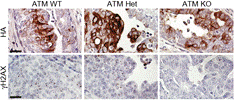Veterinary and Biomedical Sciences, Department of
Document Type
Article
Date of this Version
8-2008
Citation
Published in American Journal of Pathology (August 2008) 173(2): 411-422. DOI: 10.2353/ajpath.2008.080142.
Abstract
The persistence of human autoimmune diseases is thought to be mediated predominantly by memory T cells. We investigated the phenotype and migration of memory versus effector T cells in vivo in experimental autoimmune encephalomyelitis (EAE). We found that memory CD4+ T cells up-regulated the activation marker CD44 as well as CXCR3 and ICOS, proliferated more and produced more interferon-γ and less interleukin-17 compared to effector T cells. Moreover, adoptive transfer of memory T cells into T cell receptor (TCR)αβ-/- recipients induced more severe disease than did effector CD4+ T cells with marked central nervous system inflammation and axonal damage. The uniqueness of disease mediated by memory T cells was confirmed by the differential susceptibility to immunomodulatory therapies in vivo. CD28-B7 T cell costimulatory signal blockade by CTLA4Ig suppressed effector cell-mediated EAE but had minimal effects on disease induced by memory cells. In contrast, ICOS-B7h blockade exacerbated effector T cell-induced EAE but protected from disease induced by memory T cells. However, blockade of the OX40 (CD134) costimulatory pathway ameliorated disease mediated by both memory and effector T cells. Our data extend the understanding of the pathogenicity of autoreactive memory T cells and have important implications for the development of novel therapies for human autoimmune diseases.
Included in
Biological Phenomena, Cell Phenomena, and Immunity Commons, Immune System Diseases Commons, Medical Immunology Commons, Medical Microbiology Commons, Nervous System Diseases Commons



Comments
Copyright 2008, American Society for Investigative Pathology and Elsevier. Used by permission.